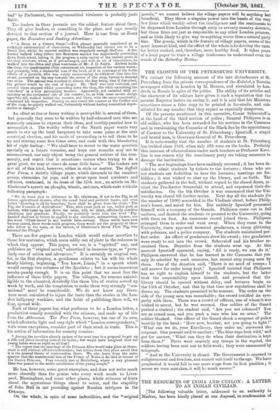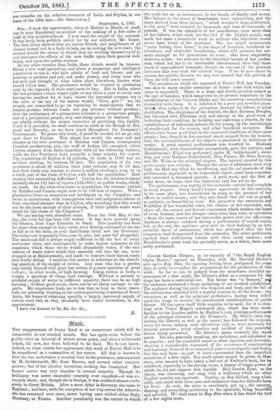THE RESOURCES OF INDIA. AND CEYLON : A LETTER TO
AN INDIAN CIVILIAN.
[The following valuable letter, addressed to an authority in Madras, has been kindly placed at our disposal, in confirmation of
our remarks on the relative resources of India and Ceylon, in our issue of the 12th inst.—ED. SPECTATOR.]
September, 5, 1861.
S1R,-I took the opportunity, when at Madras in March, of send.- ing to your Excellency an account of the making of a few miles of road in this neighbourhood. I now send the sequel of the account. It has lately been publicly called for by our collector, Mr. Grant. The first letter showed how my native friends and neighbours of all classes turned out in a body to help me in making the new road; the second details the extent to which they are availing themselves of it, and instances the effects of the new traffic upon their general well- being, and upon the public revenue. In any other country than India, these details would be truisms. Given a new road opened up, and given a numerous and intelligent population to use it, who have plenty of land and labour, and are panting to produce and sell, and make money, and every man who has seen and thought of what takes place elsewhere, knows what would follow here. The producers would be stopped in producing only by the capacity of their customers to buy. But in India, where the tax-gatherer comes round eight or ten times a year to every man having the smallest bit of land, where the incessant revenue cry is the echo of the cry of the barren womb, "Give, give !" we, the people, are compelled to go on repeating to nauseousness that we cannot produce without roads, nor pay revenue without produce ; that the preliminary of aprosperous revenue is a prosperous people, and of a prosperous people, easy and cheap access to markets. We are wholly without the means ourselves of providing this facility. Until it is provided, we shall continue to stick in the Slough of Des- pond and Poverty, as we have stuck throughout the Company's Government. To prove this truth, if proof be needed, let us go only next door to Ceylon. This island has nearly the same soil and climate as the two provinces of Malabar and Canara, consequently identical productions, rice, the staff of Indian life excepted, which Ceylon imports from India (together with all her labouring coolies), wlule the two Provinces have annually a large surplus for export. The population of Ceylon is 1 millions, its trade in 1859 was six millions sterling, its revenue 76 lacs. The population of the two provinces is about si millions, their joint revenue may be 70 lacs, and their trade may amount to about a million sterling a year, or to a sixth part of the trade of Ceylon with half the population ! How explain this astounding difference ? Ceylon has the wisdom to spend annually about 124 lacs of rupees (123,0001) on public works, chiefly on roads. In the ratio of revenue to population, the revenue yielded by Malabar and Canara ought now to be 146 lass of rupees. With a population twice as numerous and intelligent as the Cingalese, and twice as industrious, with home-grown food and indigenous labour at least one-third cheaper than in Ceylon, who would say that this would not be the least amount of their revenue, if their .public wants were cared for like those of the Cingalese ?
We are having very abundant rains. From the 16th May to this day, the total fall has been 122 inches. It has been general along the Ghauts, from Cape Comorin to Surat. This quantity has been far more than enough to keep every river flowing eastward to the sea as fall as to the brim as your Excellency lately saw the Godavery. Our rains vary in quantity from year to year, but never fail altogether. The minimum fall is always amply sufficient to fill the bed of every east-coast river, and consequently to make famine unknown in the countries which those rivers would abundantly water, if the vast volume of waste water which they annually roll into the sea, were stopped as at Rajahmundry, and made to convert their barren sands into fertile deltas. 1 mention this matter in reference to the absorb- ing question of the supply of cotton. Any man who has a garden may satisfy himself that good fine cotton is a mere question of good culture; in other words, of high farming. Cheap cotton in ham is mainly a question of cheap land carriage. Without a natural or artificial supply of water in sufficient quantity, there can be no high farming ; without good roads, there can be no cheap carriage to our ports. My experience leads me to fear that as long as these essen- tials are generally wanting in the cotton-producing countries of South India, the hopes of obtaining speedily a largely increased supply of cotton must end, as they invariably have ended heretofore, in dis- appointment. I have the honour to be, &c. &c. &c.,
p.































 Previous page
Previous page